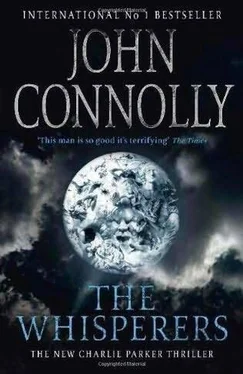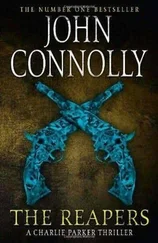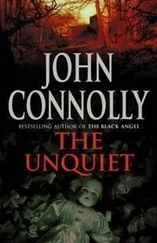Webber thumbed back the hammer on the revolver.
‘I’m telling you for the last time-’
‘Do you think that you’re the first man to have been presented with this choice, Mr. Webber? Do you honestly believe that I haven’t done this before? Ultimately, you must choose: your life, or the life of your daughter. Which do you value more?’
Herod waited. He glanced at his watch, counting the seconds.
‘I wanted to see her grow up. I wanted to see her marry, and become a mother. I wanted to be a grandfather. Do you understand?’
‘I understand. Her life will still be hers to live, and her children will lay flowers for you. Four minutes.’
‘Don’t you have anyone whom you love?’
‘No, I do not.’
The gun wavered in Webber’s hand as he realized the futility of his arguments.
‘How do I know that you’re not lying?’
‘About what? About raping and killing your daughter? Oh, I think you know that I mean what I say.’
‘No. About – about letting her go.’
‘Because I don’t lie. I don’t have to. Others lie. It is for me to present them with the consequences of those lies. For every fault, there must be a reckoning. For every action, there is a reaction. The question is: who do you love more, your daughter, or yourself?’
Herod stood. He had a cell phone in one hand, his wineglass in the other. ‘I’ll give you a private moment,’ he said. ‘Please don’t attempt to use a phone. If you do so, our deal will be off, and I’ll make sure that your daughter is raped to death. Oh, and my associates will also ensure that you don’t live to see the dawn.’
Webber did not try to stop Herod as he stepped slowly from the room. He seemed stunned into immobility.
In the hallway, Herod examined his reflection in a mirror. He straightened his tie, and brushed some lint from his jacket. He loved this old suit. He had worn it on many occasions like this one. He checked his watch a final time. From the kitchen, he discerned words being spoken. He wondered if Webber had been foolish enough to try to make a call, but the tone of voice was wrong. Then he thought that it might be Webber making an act of contrition, or saying some unheard good-bye to his daughter, but as he moved closer he heard Webber’s words.
‘Who are you?’ Webber was asking. ‘Are you the one, the one who’s going to hurt my Suzie? Are you? Are you?’
Herod glanced into the kitchen. Webber was staring at one of the kitchen windows. Herod saw Webber and himself reflected in the glass and, for just a moment, he thought that there might be a third figure visible, too insubstantial, Herod believed, to be someone in the garden looking in, and yet there was nobody else in the kitchen apart from the living, or the soon-to-be dead.
Webber turned to look at Herod. He was weeping.
‘Damn you,’ he said. ‘Damn you to hell.’
He put the gun to his temple and pulled the trigger. The sound of the shot made Herod’s ears ring as it echoed off the tiled walls and floor of the kitchen. Webber fell, and lay bucking by his overturned chair. It was an amateurish way to turn a gun on oneself, Herod mused, but then Webber could hardly have been expected to be a professional in the art of suicide; the nature of the act precluded it. The barrel of the gun had pulled upward with the shot, blowing a chunk out of the top of Webber’s skull, but he had not managed to kill himself. Instead, his eyes were wide and his mouth was opening and closing spasmodically, rather like the final moments of the fish he had left on the slab. In a moment of mercy, Herod took the gun from Webber’s hand and finished the job for him, then drank the last of the wine in his glass and prepared to leave. He paused at the door, and peered back at the kitchen window. Something was wrong. Quickly, he moved to the counter and looked out upon Webber’s neatly tended, and gently illuminated, garden. It was surrounded by high walls, and blocked off by gates at either side of the house. Herod could see no sign of another person, yet he remained troubled.
He checked his watch. He had already stayed too long, especially if the shots had attracted attention. He found the main switchbox for the house in a closet beneath the stairs, and killed all of the lights, before taking a blue surgical mask from his inside pocket and placing it over the lower part of his face. In a way, the H1N1 virus had been a blessing to him. Oh, people still sometimes stared at him in passing, but for one who exhibited such signs of illness as he did, they were looks of understanding as much of curiosity. Then, concealed by shadows, Herod became part of the night, and he put Jeremiah Webber and his daughter from his mind forever. Webber had made a choice, the correct choice in Herod’s view, and his daughter would be allowed to live. Herod, who worked alone, despite his threats to Webber, would not harm her.
For he was an honorable man, in his way.
Far to the north, as the blood from Webber’s body mixed with spilled wine and congealed upon his kitchen floor, and Herod returned to the shadows from which he had emerged, the sound of a telephone ringing echoed around a forest glade.
The man curled on the filthy sheets was dragged back to consciousness by the noise, and he knew immediately that it was them. He knew because he had unplugged the phone before he went to sleep.
Lying on the bed, he moved only his eyes, glancing slowly in the direction of the handset, as though they were already there with him and any significant shift in position would alert them to the fact that he was awake.
Go away. Leave me alone.
The television boomed into life, and for an instant he caught a snatch of some old comedy from the sixties, one at which he could remember laughing with his mother and father as he sat between them on the sofa. He felt tears spring from his eyes at the memory of his parents. He was frightened, and he wanted them to protect him, but they were long gone from this Earth and he was all alone. Then the picture faded, leaving only static, and the voices came through the screen, just as they had the night before, and the night before that, and every night since he had taken delivery of the latest consignment. He began to shiver, although the air was warm.
Stop. Go away.
In the kitchen at the far end of the cabin, the radio began to play. It was his favorite show, A Little Night Music, or it used to be. He liked to listen to it just before he tried to sleep, but not any more. Now, when he turned on the radio, he could hear them behind the music, and in the spaces between symphonic movements, and talking over the announcer’s voice: not quite blocking him out, but loud enough that he could not concentrate on what was being said, the names of composers and conductors lost to him as he tried to ignore the foreign tongue that spoke so mellifluously. And even though he did not understand the words, the sense of them was clear to him.
They wanted to be set free.
At last, he could take it no longer. He jumped from his bed and grasped the baseball bat that he kept by his bedside, swinging it with a power and purpose that his younger self would have admired. The television screen imploded with a dull whomp and a cascade of sparks. Moments later, the radio was in pieces on the floor, and then only the phone remained to be dealt with. He stood above it, the bat poised, staring at the power cord that was not even close to the outlet, and the plastic connector cable that lay tantalizingly close to the box: not connected, yet still the phone was ringing. He should have been surprised, but he was not. In recent days, he had entirely lost the capacity for surprise.
Instead of reducing the phone to shards of plastic and circuitry, he put down the bat, and restored the power and the connection. He placed the receiver close to his ear, careful not to let it touch him for fear that the voices might somehow leap from the handset into his head and take up residence there, driving him to madness, or closer to it than he already was. He listened for a time, his mouth trembling, his tears still falling, before he dialed a number. The phone at the other end rang four times, and then a machine clicked on. It was always a machine. He tried to calm himself as best he could, then began to speak.
Читать дальше












